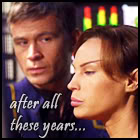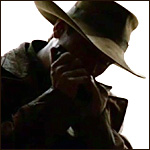Outlining questions and techniques
12 posts
• Page 1 of 2 • 1, 2
Outlining questions and techniques
I'm sorry to post this question here, as I don't think this is quite the appropriate thread for it, but I didn't see a more suitable one in this section. Could anyone teach me how to write a proper outline? I tend to come up with these story ideas, with a beginning and at least part of an ending, but I always have a hard time figuring out how to get from A to B because I never learned how to write an outline. Does anyone have any links to websites about them? It could make for a useful thread for other writers like myself.
-

Skywalker - Lieutenant
- Posts: 116
- Joined: Sat Jul 23, 2011 3:09 pm
- Location: Ye Newe Englande
Re: Outlining questions and techniques
You can try Create A Plot Outline in 8 Easy Steps.
Just a word of caution: there's no "right" way to outline, really. As long as you can see your logical progression, it's all good.
What really helped me, if you want to know the truth, was back when I was 16 I read The Screenwriter's Workbook by Syd Field. While writing a screenplay that's time-compressed for a 30-minute sitcom, 60-minute drama, or 2 hour movie is a little different than writing literature, it does teach you valuable things that you can apply to literature. You get really good at identifying elements that don't further the plot and therefore should go. What may help you the most are the sections about structure--it's basically how to outline a screenplay, and the formula works quite well for fiction literature as well. If you think of it in terms of a 2 hour movie movie, it'll go something like this:
1. Expositon: Introduce the characters and the situation.
2. Plot Point 1: The event that spins the action into another direction. In "Broken Bow," that would be when the Suliban kidnap Klang. It's no longer a mission of take this Klingon dude home and come back. Now they have to go find him, and they get caught into this much bigger thing with the Suliban.
3. Plot Point 2: Another event that spins the action toward the resolution. Think back to "Broken Bow" and see if you can spot it.
4. Climax/resolution: Much like its sexual counterpart, this is the part of your story where the planets line up and everything comes together. THIS IS NOT YOUR ENDING. It just refers to how your main character's problem--the core of the plot--is getting solved.
5. Ending--tie up loose ends (or not, if it's supposed to be that kind of story), show the characters (BRIEFLY) headed toward their new normal.
Between Plot Point 1 and Plot Point 2, you need dramatic conflict--Plot Point 1 establishes your character's dramatic need ("Broken Bow"--mission of exploration is in jeopardy because Archer lost Klang to the Suliban--he needs to get Klang back not only for Klang's sake, but so the mission isn't jeopardized and the Vulcans aren't proved right.) Dramatic conflict is all the obstacles the character encounters as he tries to satisfy his dramatic need. Again, refer to "Broken Bow"--what kind of obstacles did Archer encounter?
Your story can have more than two plot points, but you need at least those two major ones.
If you know the elements of all five steps, you have the foundation upon which you can build any story, whether it's for the big screen or print.
There are no hard and fast rules about when these elements have to happen, but in a two hour movie, Plot Point 1 usually happens about 20 minutes or so into the story. (Think about it; how much time do you really want to spend showing what your character's dull, boring, routine life is like? Your viewer/reader wants to get into it!) Then you get about an hour of conflict between Plot Point 1 and Plot Point 2. Also, something different usually happens about midway between Plot Point 1 and Plot Point 2, to break things up a bit. In an action movie, this is where they'd usually stick the sex scene. The Climax comes pretty soon after Plot Point 2, usually within about 10 minutes. Then your ending. Don't spend too much time on your happily ever after. Just tell us that they get one.
Again, a little different than writing literature, but you can see where this would be helpful in keeping your literature writing tight and on track, while answering all those pesky plot questions that often stump us.
Field also uses a technique involving writing summaries of scenes on index cards which can be rearranged and thrown away as needed.
His book is still in print, the latest edition is for sale and I highly recommend it to any writer, not just future screenwriters.
Just a word of caution: there's no "right" way to outline, really. As long as you can see your logical progression, it's all good.
What really helped me, if you want to know the truth, was back when I was 16 I read The Screenwriter's Workbook by Syd Field. While writing a screenplay that's time-compressed for a 30-minute sitcom, 60-minute drama, or 2 hour movie is a little different than writing literature, it does teach you valuable things that you can apply to literature. You get really good at identifying elements that don't further the plot and therefore should go. What may help you the most are the sections about structure--it's basically how to outline a screenplay, and the formula works quite well for fiction literature as well. If you think of it in terms of a 2 hour movie movie, it'll go something like this:
1. Expositon: Introduce the characters and the situation.
2. Plot Point 1: The event that spins the action into another direction. In "Broken Bow," that would be when the Suliban kidnap Klang. It's no longer a mission of take this Klingon dude home and come back. Now they have to go find him, and they get caught into this much bigger thing with the Suliban.
3. Plot Point 2: Another event that spins the action toward the resolution. Think back to "Broken Bow" and see if you can spot it.
4. Climax/resolution: Much like its sexual counterpart, this is the part of your story where the planets line up and everything comes together. THIS IS NOT YOUR ENDING. It just refers to how your main character's problem--the core of the plot--is getting solved.
5. Ending--tie up loose ends (or not, if it's supposed to be that kind of story), show the characters (BRIEFLY) headed toward their new normal.
Between Plot Point 1 and Plot Point 2, you need dramatic conflict--Plot Point 1 establishes your character's dramatic need ("Broken Bow"--mission of exploration is in jeopardy because Archer lost Klang to the Suliban--he needs to get Klang back not only for Klang's sake, but so the mission isn't jeopardized and the Vulcans aren't proved right.) Dramatic conflict is all the obstacles the character encounters as he tries to satisfy his dramatic need. Again, refer to "Broken Bow"--what kind of obstacles did Archer encounter?
Your story can have more than two plot points, but you need at least those two major ones.
If you know the elements of all five steps, you have the foundation upon which you can build any story, whether it's for the big screen or print.
There are no hard and fast rules about when these elements have to happen, but in a two hour movie, Plot Point 1 usually happens about 20 minutes or so into the story. (Think about it; how much time do you really want to spend showing what your character's dull, boring, routine life is like? Your viewer/reader wants to get into it!) Then you get about an hour of conflict between Plot Point 1 and Plot Point 2. Also, something different usually happens about midway between Plot Point 1 and Plot Point 2, to break things up a bit. In an action movie, this is where they'd usually stick the sex scene. The Climax comes pretty soon after Plot Point 2, usually within about 10 minutes. Then your ending. Don't spend too much time on your happily ever after. Just tell us that they get one.
Again, a little different than writing literature, but you can see where this would be helpful in keeping your literature writing tight and on track, while answering all those pesky plot questions that often stump us.
Field also uses a technique involving writing summaries of scenes on index cards which can be rearranged and thrown away as needed.
His book is still in print, the latest edition is for sale and I highly recommend it to any writer, not just future screenwriters.
Avatar by Misplaced.
-

Aquarius - Site Admin
- Posts: 5516
- Joined: Sat Sep 11, 2010 2:30 pm
Re: Outlining questions and techniques
These are great for longer fic, thanks!
Any insight on shorter ones? Or resources? By short, probably anything under 5K.
Any insight on shorter ones? Or resources? By short, probably anything under 5K.
- entkayjay
- Commander
- Posts: 616
- Joined: Fri Sep 17, 2010 8:31 am
Re: Outlining questions and techniques
Wow, thanks, Aquarius! That was really helpful.
- Brandyjane
- Lt. Commander
- Posts: 359
- Joined: Mon Oct 04, 2010 7:18 am
Re: Outlining questions and techniques
Thank you, Aquarius! 
-

Skywalker - Lieutenant
- Posts: 116
- Joined: Sat Jul 23, 2011 3:09 pm
- Location: Ye Newe Englande
Re: Outlining questions and techniques
entkayjay wrote:These are great for longer fic, thanks!
Any insight on shorter ones? Or resources? By short, probably anything under 5K.
I haven't looked. Sorry. That was just the result of a quick google plus years of studying the screenwriting process.
Honestly, though, I would think a shorter fic would be very similar, just with a narrow focus. Establish your character(s) .and the situation. Establish the dramatic need. Create an obstacle to that dramatic need. Show us if s/he gets what s/she wants (resolution). Done.
Honestly, though, I would think that the length of the story would be determined by the dramatic need and the obstacles toward getting it--take however long you need to properly develop the idea. Not the other way around.
Avatar by Misplaced.
-

Aquarius - Site Admin
- Posts: 5516
- Joined: Sat Sep 11, 2010 2:30 pm
Re: Outlining questions and techniques
Would be kind of neat to have a discussion on the different kinds of fiction and how people approach it. I always learn from what others do. Thanks!
- entkayjay
- Commander
- Posts: 616
- Joined: Fri Sep 17, 2010 8:31 am
Re: Outlining questions and techniques
You're always welcome to open a thread! 
I was giving some more thought to the longer fic/shorter fic question, and the more I thought about it, the more I reasoned that there really shouldn't be too much of a difference in the outlining/planning process. For example, in screenwriting, the same dramatic structure (exposition, plot points, etc) is used for a 30 minute sitcom, hour long drama, or 1 1/2 - 2 hour movie. In screenwriting, though, you get a little extra help keeping on track because of your page count--you figure about a page per minute, so a sitcom script is going to be about 30 pages, an hour long drama is going to be about 60 pages, and the average movie is going to be about 100-120 pages. So in the movie or even the "Broken Bow" example, we would know that we want Plot Point 1 to happen somewhere around 20. It doesn't have to be exact, but in that neighborhood. Everything up to that point is going to be exposition--establishing the situation.
In an episode of an hour long drama, the characters have generally already been introduced in the pilot, so you don't have to spend a lot of time on that. You just need to do the setup--show the viewer *which* characters are going to be pivotal to this week's plot (last night's "Singularity" established T'Pol as the one who keeps her marbles together through the episode's crisis) and what the situation is in this episode (anomaly knocks everyone but T'Pol out of condition and the ship is in danger). Rather than have it come at page 20 in an hour long drama (a third of your time would be gone if you did!), this tends to happen in the teaser before the credits. Plot Point 1 might also happen in the teaser, or not long after we come back from the commercial, depending on the type of the story and the artistic choices made by the director.
Any way, the next time you watch a sitcom, a drama, and a movie, think about the similarities you see in the structure. It sounds so formulaic in print, but when you're on a time budget, it kind of has to be.
A piece of literature really isn't that different. Sure, you can do some things artistically with it that you can't do on (or would just seem too abstract for) TV. But generally speaking, you need to keep your plot moving, your pacing is important, and things need to "happen" before your reader gets bored.
And obvious exception would be, say, a vignette. Its job isn't to be a huge story, it's more of a snapshot of your character. But there should still be some kind of dramatic need, and some kind of movement toward or away from satisfying it. Otherwise there's no "point". Same with a drabble, when you think about it.
I was giving some more thought to the longer fic/shorter fic question, and the more I thought about it, the more I reasoned that there really shouldn't be too much of a difference in the outlining/planning process. For example, in screenwriting, the same dramatic structure (exposition, plot points, etc) is used for a 30 minute sitcom, hour long drama, or 1 1/2 - 2 hour movie. In screenwriting, though, you get a little extra help keeping on track because of your page count--you figure about a page per minute, so a sitcom script is going to be about 30 pages, an hour long drama is going to be about 60 pages, and the average movie is going to be about 100-120 pages. So in the movie or even the "Broken Bow" example, we would know that we want Plot Point 1 to happen somewhere around 20. It doesn't have to be exact, but in that neighborhood. Everything up to that point is going to be exposition--establishing the situation.
In an episode of an hour long drama, the characters have generally already been introduced in the pilot, so you don't have to spend a lot of time on that. You just need to do the setup--show the viewer *which* characters are going to be pivotal to this week's plot (last night's "Singularity" established T'Pol as the one who keeps her marbles together through the episode's crisis) and what the situation is in this episode (anomaly knocks everyone but T'Pol out of condition and the ship is in danger). Rather than have it come at page 20 in an hour long drama (a third of your time would be gone if you did!), this tends to happen in the teaser before the credits. Plot Point 1 might also happen in the teaser, or not long after we come back from the commercial, depending on the type of the story and the artistic choices made by the director.
Any way, the next time you watch a sitcom, a drama, and a movie, think about the similarities you see in the structure. It sounds so formulaic in print, but when you're on a time budget, it kind of has to be.
A piece of literature really isn't that different. Sure, you can do some things artistically with it that you can't do on (or would just seem too abstract for) TV. But generally speaking, you need to keep your plot moving, your pacing is important, and things need to "happen" before your reader gets bored.
And obvious exception would be, say, a vignette. Its job isn't to be a huge story, it's more of a snapshot of your character. But there should still be some kind of dramatic need, and some kind of movement toward or away from satisfying it. Otherwise there's no "point". Same with a drabble, when you think about it.
Avatar by Misplaced.
-

Aquarius - Site Admin
- Posts: 5516
- Joined: Sat Sep 11, 2010 2:30 pm
Re: Outlining questions and techniques
If you have an "oldies" TV station, the Quinn Martin shows like "The Fugitive", "12 O'Clock High", "The Streets of San Francisco", "The F.B.I." and "Cannon" to name a few were all set up as 4 acts and an epilog. All parts were labeled so on screen. You might want to watch a couple of those to see how they handled it.
MR_Beautiful avatar by M&M (Mareel and Misplaced)
-

Glory1863 - Captain
- Posts: 1001
- Joined: Sat Sep 18, 2010 9:00 am
- Location: Illinois
Re: Outlining questions and techniques
Skywalker wrote:I'm sorry to post this question here, as I don't think this is quite the appropriate thread for it, but I didn't see a more suitable one in this section. Could anyone teach me how to write a proper outline? I tend to come up with these story ideas, with a beginning and at least part of an ending, but I always have a hard time figuring out how to get from A to B because I never learned how to write an outline. Does anyone have any links to websites about them? It could make for a useful thread for other writers like myself.
I don't think I use a proper outline; whatever works for you to organize your thoughts is the way to go. For me, I only really use an outline when I'm doing something more than 4-5 chapters. If it's shorter than that I don't need one to keep me organized. I remember basic roman numeral-ed research paper and report outlines from high school and so I use that formatting technique to organize what thoughts I have. The roman numeral correspond to chapters and the letters to sections within that chapter. The actual verbiage in the outline is usually fragments of prose or dialog, "do something here" notes to myself, or a quote from a bit of research.
As I'm writing, I just keep adding/subtracting from the outline to make sure I'm not coming up on a problem - i.e. a plot hole I didn't anticipate. It's not really an outline that addresses the basic story-telling elements but one that works more as an organized "list" of "to-dos". It's how my brain works best.
The simplest outline for me could be:
I. Part One - setup the problem, the environment and the players
II. Part Two - fix part of the problem, change something, make the problem worse
II. Part Three - up the stakes, find the connection, fix all the problems and make the characters happy
-

EntAllat - Site Admin
- Posts: 3720
- Joined: Tue Jan 11, 2011 3:02 pm
- Location: Texas
12 posts
• Page 1 of 2 • 1, 2
-
Who is online
Users browsing this forum: No registered users and 2 guests
Powered by phpBB © 2000, 2002, 2005, 2007 phpBB Group
Design by pit
Design by pit